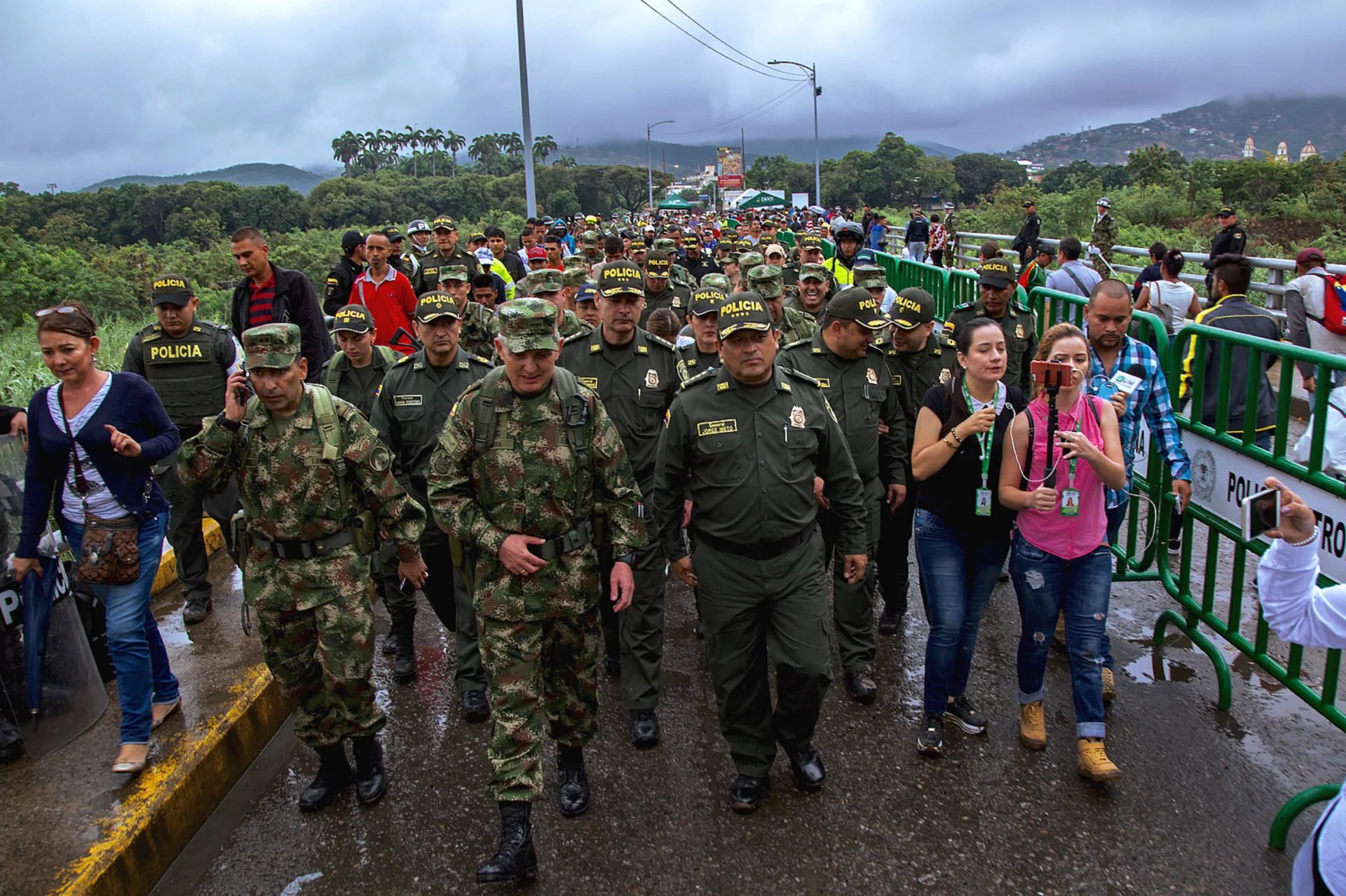Since its inception, the government of Gustavo Petro, which defines itself as progressive, has implemented measures that have, rather than benefiting the Venezuelan migrant population in Colombia, led to regressive actions. These policies have increased the vulnerability and uncertainty of this population, resulting in stagnation, confusion, and greater difficulties in achieving regularization and welfare.
One of the most serious problems has been the stagnation in the regularization processes and the rhetoric that seeks to render this migrant population’s situation invisible, alongside the denial of the complex humanitarian emergency in Venezuela. Although the Petro administration inherited the Temporary Protection Statute for Venezuelan Migrants (ETPV) from the government of Iván Duque, its implementation has faced significant barriers that appear to be deliberately imposed.
President Petro has aligned his narrative with that of the Bolivarian government by attributing migration to the economic sanctions imposed by the United States in 2019. However, this claim has been refuted, as the migration crisis began in 2015, before the sanctions, driven by a deep economic crisis, shortages of basic commodities, high inflation, and security issues in the country. All this is a consequence of the current political model.
In addition, Petro has attempted to frame the migration discussion around those who cross the Darien, thus minimizing the presence and intent to stay of Venezuelan migrants in Colombia. This approach has contributed to blurring the issue from the national agenda, downplaying the importance of Venezuelan migrants seeking to settle in the country. In the words of the director of Migration Colombia, one of the government’s purposes has been to “de-Venezuelanize” the migration issue, which has demonstrated profound institutional irresponsibility already beginning to generate consequences.
While it is crucial to protect and make visible other migratory flows in Colombia, such as Haitian migration, the protection of people is not only a question of numbers. Attempting to remove the importance of Venezuelan migration and the attention it requires from the agenda, especially for political reasons, generates greater risks in migration management and increases the vulnerability of this population.
The crisis in migration management
Undoubtedly, the arrival of the Venezuelan migrant population in Colombia has presented an institutional challenge for the country. When speaking of crisis, we should not refer to a population fleeing in search of their own survival, but to the crisis in migration management, which fails to respond to people’s needs. In response to this situation, previous Colombian governments implemented regularization measures intending to provide regular status, facilitating their integration into Colombian society and protecting their rights.
In 2017, the Special Permit to Stay (PEP) marked a crucial milestone by allowing the Venezuelan migrant population to regularize their situation. The document was valid for two years with the possibility of renewal, allowed working, and offered protection against deportation. It was valid to accumulate years to apply for permanent residency, facilitated internal mobility, and allowed to continue or access studies at all levels in Colombia.
In 2021, Colombia took a crucial step with the creation of the Temporary Protection Status for Venezuelan Migrants (ETPV). This statute, which is valid for 10 years, was designed to provide a more complete and stable legal framework for the Venezuelan migrant population. The ETPV includes two main components: the Single Registry of Venezuelan Migrants (RUMV) and the Temporary Protection Permit (PPT).
The RUMV is a registry in which refugees and migrants from Venezuela must register. This registry allows the Colombian government to have a clear census of the migrant population. The PPT, obtained by registering in the RUMV, is an identification and regularization document that grants Venezuelan migrants access to basic rights and services in Colombia, such as education, health, and employment. In this way, the Temporary Protection Permit is a fundamental tool of the ETPV, as it facilitates the social and economic inclusion of Venezuelan migrants in the country, ensuring that they can live regularly.
Despite criticisms of the latter mechanism, such as its initial incompatibility with the refugee application, which was resolved by the Constitutional Court in Ruling SU-543 of 2023, and the absence of an express differential approach, this process indeed sought to harmonize the different mechanisms existing to date. In addition, it recognized that the majority of the population was a population with a vocation to remain in the country. In the last year, questions have revolved around the situation of people who could not access this permit due to temporary restrictions and the continuity of the mechanism for those who have arrived in the country in the last year.
However, while waiting for new announcements for a growing population in irregular condition, Migration Colombia surprised by announcing that during the year 2023 there was a decrease in the migrant population as a result of the resumption of binational relations. This statement could not be further from reality: What has been happening is a change in the destination of the population, which has been moving mainly to the United States, but migration in general continues to increase. According to the latest update of June 2024 of the Interagency Coordination Platform for Refugees and Migrants (R4V), there were 7,774,494 Venezuelan refugees and migrants in the world, of which 2,857,528 are in Colombia (May 2024).
The new (old) regularization mechanism
As part of the most recent announcements, the Colombian government presented the PEP-TUTOR, a new regularization mechanism for legal representatives or guardians of children and adolescents who have a Temporary Protection Permit (PPT) in force. However, the coexistence of the PEP-TUTOR with other regularization instruments such as the PPT has generated criticism and confusion among the migrant population and civil society organizations. Among the main concerns are an arbitrary cut-off date associated with the re-establishment of binational relations, the exclusion of fathers and mothers of children born in Colombia, and the duplication of requirements, breaking with one of the reasons for the creation of the Temporary Protection Status for Venezuelans (ETPV), which was to harmonize all existing permits under a single modality.
This decree, proposed by the Ministry of Foreign Affairs and Migration Colombia, aims to regularize the situation of more than 270,000 Venezuelan migrants acting as legal representatives of minors in Colombia. Nonetheless, the requirements to obtain the PEP-TUTOR are stricter than those of the PPT, and make it difficult to access evidentiary documents such as an apostilled birth certificate, a complex process for many migrants.
The PEP-TUTOR could be granted until May 30, 2031 and would not be extendable. After this date, those who wish to remain in Colombia must apply for and obtain a visa issued by the Ministry of Foreign Affairs, complying with the legal requirements. In addition, August 12, 2022 is established as the deadline for regularization, excluding parents of children who regularized after that date, which limits the access of many families to regularization if they arrived in Colombia later.
This measure has generated great confusion and is perceived as regressive, as it does not consider the current conditions of this population. There is uncertainty about whether the new mechanism will offer greater or lesser rights, and it seems to be assumed that the normalization of the situation in Venezuela and the re-establishment of binational relations have eliminated barriers to accessing documents.
However, the resumption of diplomatic relations between Colombia and Venezuela, although significant, has not brought substantial improvements for migrants. Since the re-establishment of diplomatic and consular relations in August 2022, the reopening of Venezuelan consulates in Colombia has not guaranteed better access to essential documents such as passports.
Bureaucratic and economic barriers to obtaining these documents remain insurmountable for most. Obtaining a Venezuelan identity card, necessary for any consular procedures, is only possible in Venezuela. In addition, the costs associated with obtaining a passport are prohibitive for many families, with prices in excess of US$200 plus consular fees, an exorbitant sum considering that the minimum wage in Colombia is around US$320 and that most migrants have incomes much lower than this.
The consequences of a restrictive policy
It is undeniable that the measures adopted by the government of Gustavo Petro have been more regressive in terms of rights for the Venezuelan migrant population, driven by political reasons and interests with the Venezuelan regime. This is particularly dangerous in a context where expressions of xenophobia and discrimination continue to increase. According to the latest Invamer Survey, 65% of Colombian society has an unfavorable opinion of Venezuelans who have come to the country to stay. This rejection has led to a higher approval of Petro’s migratory management compared to Duque’s, due to his more restrictive stance and security focus.
However, despite this institutional stance and the generalized rejection of migration by Colombians, the international community continues to show significant concerns. On June 19, 2024, the Inter-American Commission on Human Rights (IACHR) released its preliminary observations following a visit to Colombia in April 2024. The IACHR noted that, although previous efforts have been made such as the implementation of the Temporary Statute of Protection for Venezuelan Migrants, these policies need to be expanded and strengthened. During the visit, cases of racism, xenophobia, and victimization against migrants from Venezuela, Haiti, Ecuador, and other countries were reported. In addition, the territorial control of armed groups has provoked resistance, confinement, and forced internal displacement, exploiting the humanitarian crisis to engage in human trafficking, sexual exploitation, and other forms of modern slavery.
For her part, Siobhán Mullally, special rapporteur on trafficking in persons, especially women and children, expressed deep concern about the dangers faced by migrants and refugees, especially children and adolescents, when crossing the Darién Gap. During this transit, migrants, particularly women, children, LGBTQI+ persons, and persons with disabilities, are exposed to sexual violence and other serious human rights violations, including trafficking. The majority of these migrants come from Venezuela, Haiti, and Ecuador.
An additional issue of concern is the limited access to temporary protection permits and essential services such as health, social security, and formal employment for Venezuelan migrants, which increases their vulnerability to exploitation. Mullally also highlighted the plight of street children, children with disabilities, and children working in the informal sector or as domestic workers, who face high risks of being trafficked. Venezuelan migrant children are especially vulnerable to sexual and labor exploitation due to administrative obstacles that hinder their access to temporary protection and education. In its recommendations, she urges expanding access to temporary protected status for Venezuelans who arrived after January 31, 2021 and reducing administrative delays to ensure effective access to health and other essential services for migrants and refugees.
Finally, the above reflects that neither restrictive measures prevent people in need of migration from doing so, nor xenophobia from becoming a barrier to their arrival. Migration management in Colombia faces significant challenges that demand an approach focused on human rights, beyond political and restrictive considerations. The measures adopted by the government of Gustavo Petro have increased the vulnerability and uncertainty of the Venezuelan migrant population, generating a management crisis rather than a solution.
*Translated by Janaína Ruviaro da Silva from the original in Spanish.













